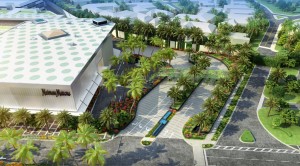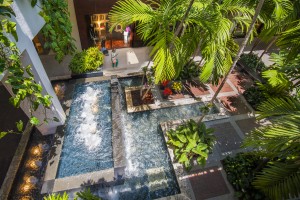After revealing details of a $400 million-plus renovation and expansion of the Bal Harbour Shops in June, Whitman Family Development expects to move closer to bringing its plans to reality on Tuesday evening.
The Bal Harbour Village Council will discuss the overall expansion and proposed land swap. Whitman president and CEO Matthew Whitman Lazenby will call on the council to place the land swap on the ballot. Without the land swap, Lazenby told The Real Deal, there is no expansion.
Whitman will fund the renovations, which will include a new entrance, wider sidewalks, a new canopy, landscaping and some new exterior walls. Bernard Zyscovich of Zyscovich Architects is the lead designer on the project. The upgrades will also include the addition of Barneys New York, expansions of existing Neiman Marcus and Saks Fifth Avenue stores, and new luxury boutiques. Voter approval later this year is required for the land swap between the village and Whitman.
“The last project that came through using that same metric was about a $20 million public benefit package,” he said.
If all goes according to plan, Whitman Family Development will break ground on the expansion immediately following the referendum vote. Lazenby expects it to take five years to complete.
TRD sat down with Lazenby to discuss the company’s plans for Bal Harbour and its involvement with Brickell City Centre.

Rendering of the proposed north entrance of Bal Harbour Shops
What does the expansion plan entail?
We have about 100 stores on two levels. Neiman Marcus would go from 90,000 square feet to 140,000 square feet. Saks, which is now at 130,000 square feet, would move to the west end of the property at 180,000 square feet. What was Saks Fifth Avenue, that becomes Barneys at 50,000 square feet.
By the numbers, we’re about a 450,000-square-foot shopping center today. That includes the two anchor stores. When we’re done, we would be around 700,000 square feet.
What stage of negotiations are you in with the adjacent Church by the Sea?
There’s a church that’s been here since the beginning of time in terms of the village, and west of that is the town hall. This is our 50th anniversary, and without exaggeration the last 40 years have been spent trying to negotiate a deal with the congregational church. Three generations of my family were involved in this transaction.
In 2006, we signed an option agreement with the church that provided they relocate from their spot on 96th Street to right behind Village Hall. That deal is done. A similar offer has been proposed for the Village Hall site, where we build them a town hall site and in return they sell us the land — a referendum for that is required.
Our plans move the church onto the Village Hall site. The area that is least impactful in terms of the church is that site. If there’s no place for the church, then there’s no expansion. We think our plan ensures that the Village of Bal Harbour remains the center for luxury living. A citizen-led referendum is the way to go.
Does the church have a preference as to where it goes?
The church has become a fantastic partner. If you look back, our relationship has not always been good. Everybody recognizes that the fulfillment of this vision is beneficial for everyone. I wouldn’t say they don’t care where they go, but I would say they’ve found a way to be very flexible. The big thing for the church is visibility.

Bal Harbour Shops
Whitman’s plans include open, green spaces. Why was that important?
One thing everyone agrees upon is that Bal Harbour is lacking in green civic space. How can we address that problem? The size of the Fairfield [Manor] co-op [at 9800 Collins Avenue], which we acquired, is three times the size of the Village Hall land.
Bal Harbour is one square mile, and the only land in the village that is publicly owned and doesn’t have anything on it is a small spit of land on Collins Avenue northbound toward Haulover. Keep in mind, immediately over that bridge is the county-owned Haulover Park. But the idea of actually having some kind of activated park space is something the community needs. The Fairfield site, whether the village wanted to put their Village Hall there and also create a park around it — that’s certainly an option. Using the village-owned site along the waterfront certainly makes a lot of sense.
How the village chooses to do that is certainly up to them. We want to make Bal Harbour even better, so part of that public benefit won’t just be ‘Here’s some land. Good luck.’ We would certainly facilitate it and make it easier.
[vision_pullquote style=”3″ align=””] “I’ve had three different people approach me over the last 12 years and asked me if we would allow their ashes to be spread here. The first time, I laughed. By the third time, I realized they were serious.” [/vision_pullquote]Why expand?
What we’ve been seeing in the luxury retail world is a trend toward larger and larger and larger stores. Things do seem to work in cycles, but we’re in a cycle where there’s a luxuriousness associated with space itself. Where tenants used to be comfortable with 2,000 square feet, which is the size of our typical store bays, and then 4,000-square-foot stores. Those 2,000-square-foot stores today want to be 4,000 square feet, and many want to be 8,000, 12,000, 20,000.
A huge component of this expansion is not to bring in new stores, but to satisfy the needs of the existing ones. This shopping center has always been an important location for all of our tenants.
We’ve reached a point where the fact that they’re so successful selling luxury goods in spaces that are now, in many cases, way too small, results in a sales-per-square-foot productivity number that’s many multiples higher than the national average — but that’s actually further evidence that the stores are way too small.
That being said, I’ve yet to meet the woman who’s waiting for our Chanel store to get to 10,000 square feet before she shops there.
I think most people would say the merchandise mix is what makes it unique, but I can’t tell you how many times people have pulled me aside and relayed to me a personal story that happened here. It really is a place people connect to that transcends, ‘I got a good deal at Saks.’ I’ve had three different people approach me over the last 12 years and asked me if we would allow their ashes to be spread here. The first time, I laughed. By the third time, I realized they were serious.
How many stores would be added through the expansion?
We can’t start leasing in earnest until it’s approved. I would think around 30. There are more than 30 prospects who belong here and who we would have here today if we had the space.
We try so hard to not be a traditional mall experience. Aventura is 2.7 million square feet. There’s an intimacy we have that we won’t lose.
Why partner with Swire Properties and Simon Property Group on Brickell City Centre?
It was undeniable to us that the demand was not only there but merited it. Miami has clearly evolved over the years and has been on a speed-train evolution over the last five years. As residents, we know the area well. As retail developers, we know the area as well as any luxury developer could. The Brickell market has a greater density than we have here. Eighty percent of our business is generated by market visitors.
